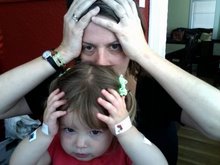 The Little Engine that Could
The Little Engine that Could Retold by Watty Piper
Illustrated by George & Doris Hauman
1930, Platt & Munk
Being 2, my daughter emerges into actual personhood a bit more each day. Lately I have been irrationally proud of her, to the point where I sometimes get weepy, just remembering some little thing she did or said. Today, it was her response to this beloved classic.
Like most every toddler across America, Rosie is having a train moment. So she warmed to "The Little Engine" before we even cracked the front cover.
"OH!," she pointed. "A TRAIN!"
(Please note: genius in the making.)
Fully supportive of this story and all it represents, I had been excited to find a library copy purporting to be the complete, original edition. But I soon understood why abridged versions abound -- for adults, there's something truly tedious about the pacing, which repeats the exact same, not-so-melodious phrases as various engines arrive and then reject the stranded toys' pleas for help. Worse, their chief spokesman is the "little toy clown," a moniker that doubles as an ugly little tongue twister.
Notice I said "for adults." As every parent knows, kids have a frightening appetite for repetition. If the first round is good, the second time is even better, and the third exponentially so, so that when the fourth iteration arrives, ecstasy ensures.
Having slogged through the middle section of the book, we now arrive at the payoff: One's audience leaning forward, clapping, beaming with delight and ultimately chiming in as the title character (a lady engine, by the way) hitches herself to the stranded train and slowly begins her journey over the mountain:
Puff, puff, chug, chug, went the Little Blue Engine.
"I think I can -- I think I can -- I think I can -- I think I can..."





1 comment:
I just got this book for my train-obsessed son because I remembered it from my childhood. I was delighted that both the little red train and the little blue train were female! Of course my son it just delighted that they are trains.
Post a Comment